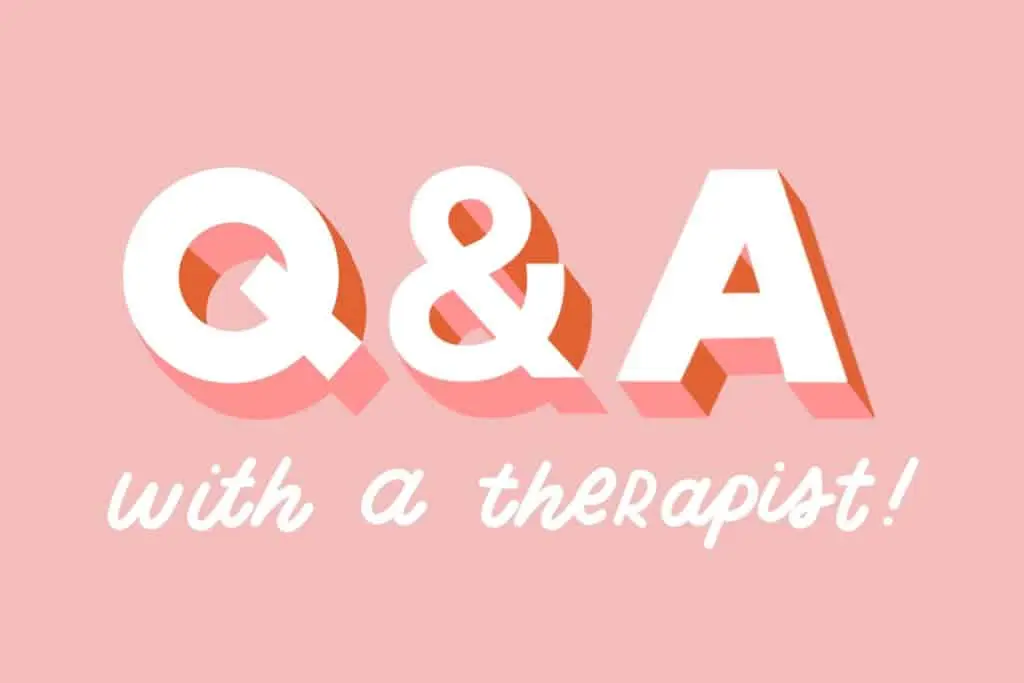At Artsy Affirmations, is super passionate about mental well-being and helping you have access to the resources needed to improve your mental health. They asked on Instagram what questions people had for therapists and were blown away by the responses, and by just how many people had the same questions and concerns. They asked Morgan Bradwell (find her on Instagram: @morganwatkinsbradwell), a psychotherapist for Eye Heart World, your hard-hitting questions about therapy and she went above and beyond answering your most-wondered questions. Check out her answers below!
How do I tell my parents that I’d like to see a therapist?
This is such a great question, and it brings me joy that teenagers are asking this. Gen Z has such a positive attitude toward mental health & I absolutely LOVE that! I’m not going to sugarcoat it, friends – talking to your parents about mental health struggles takes a lot of courage and vulnerability. I encourage you to remember that there is tremendous strength in vulnerability.
I would take some time to journal about what you feel comfortable telling them at this time (for example, you may want to tell them if you’ve been experiencing anxiety, panic attacks, lack of motivation, fatigue, etc.). I would also plan to tell them how long this has been going on and/or how long you’ve been thinking about seeing a therapist.
Unfortunately, you may face some hesitation. The hesitation could stem from cultural, generational, or religious factors, or it may even be related to their own mental health history. If they seem to respond negatively to the idea of seeing a therapist, you could say something along the lines of “if my ankle was hurting this long and I couldn’t live my life like I normally do, I would want to see a specialist. To me, seeing a therapist for my anxiety/depression/etc. is the same thing.” If they press for more information that you’re not able or willing to talk about at this point, it’s okay. While I encourage you to share what you can with a trusted adult, it’s okay if you’re not willing to share every detail. You can set a simple boundary by saying something along the lines of “I know you’re asking these questions because you care, but this is difficult for me to talk about so I don’t want to answer any more questions right now.”
NOTE: I feel the need to acknowledge the fact that some people are walking through difficult and traumatic things that are directly related to a parent (abuse, drug use in the home, domestic violence, etc.). Others unfortunately may have parents that are close-minded to the idea of therapy. Others may not have health insurance or means to pay. I want you to know two things:
1. You are not alone.
2. There are resources for you.
There are numerous crisis lines & text lines across the nation. The National Suicide Prevention Hotline is 1-800-273-8255, and the Youth Crisis Hotline is 1-800-448-4663. There are also crisis lines specifically for domestic violence, sexual assault, addiction, abuse, eating disorders, and more. Additionally, many states have policies in place for teenagers that are seeking physical or mental healthcare without parental consent. You could look into a community mental health center or ask a trusted adult for some assistance with looking for resources in your community.
If you are experiencing thoughts of suicide and/or feel like you are an active threat to yourself or others, call 911 or visit your nearest emergency room.
Is it okay to cry in my session?
Absolutely. This is YOUR time to process however you need to process.
Do I need to start from the beginning of my life story, or just the important parts?
You will most likely be guided or prompted by your therapist, especially in the first few sessions. I definitely don’t expect my clients to come in on their first session, plop down on my comfy chairs, and begin their story like they’re reading a novel: “Morgan was born on a crisp autumn morning in the heart of sweet home Alabama.” Every therapist has their own style to building rapport and learning your story. I would encourage you to trust that they will guide conversation when they need to. And if you ever feel stuck or unsure about where to start, it’s perfectly okay to say that.
How do I know if my therapist isn’t working out or if I’m just shy?
I genuinely believe this is one of the most wondered & least asked questions when it comes to therapy!
As much as I wish everyone could try therapy for the first time and immediately establish a therapeutic relationship with a therapist that is a perfect match for them, the reality is that it’s not always that easy.
As a trauma-informed therapist, I personally believe that safety is foundational to a positive therapeutic relationship. So in applying that lens to this question, I would ask you, “Does your relationship with your therapist feel safe for you?”
In other words, do you feel physically and emotionally comfortable alone in a room with them? When you are vulnerable, do you feel seen and heard? Are your experiences validated by your therapist? Do you feel like the power within your therapeutic relationship is balanced, or do you find yourself struggling to speak up when your therapist misunderstands you or incorrectly interprets something you’ve said?
If your therapeutic relationship feels physically and emotionally safe and you believe that it’s a good match, then this may be an opportunity for you to grow your trust and vulnerability muscles in the safe space of their office.
If your therapeutic relationship feels unsafe, if the power feels imbalanced, if you do not feel empowered to correct your therapist when they misunderstand or voice an opposing opinion, if you don’t feel truly seen, heard, or validated – then this is not the therapist for you. It’s okay to find a new one!
How frequently should I try to see my therapist? If I can only afford to see them once a month, will that still be helpful?
There are a few factors to consider when deciding how often to see your therapist.
First and foremost, I would be honest about what you feel would be helpful for you. The thought of weekly sessions feels overwhelming for some people; for others, the thought of monthly or twice monthly sessions feels like it’s not enough.
Next, consider the costs. The reality of our healthcare system is that your insurance may only cover a certain amount of sessions. If you’re self-pay, I recommend being honest about what you can realistically budget for therapy.
Then, consider your circumstances & your therapist’s recommendations. For example, if the client’s circumstances and experiences are causing severe dysfunction, the therapist may recommend a therapeutic approach may be more intensive – they may have one or more sessions per week. Another client may have difficulty securing transportation or childcare, so a bimonthly or monthly schedule fits their needs best. Every individual client will have different needs, strengths, barriers, and desires – and that’s okay. Your therapist can hold all of this in mind as the two of you develop your treatment plan.
Here’s the bottom line: Therapy can be helpful & effective regardless of how many days pass between your sessions.
How do I bring up topics that are awkward or uncomfortable for me to talk about?
I believe this falls back on the concept of safety within the therapeutic relationship. If you don’t feel physically or emotionally safe enough to talk about certain things yet, that’s okay. This safety-building process does not need to be rushed. It’s perfectly okay to tell your therapist that there is more to your story that you’d eventually like to share, but not yet.
Is there a “right” time to go to therapy?
If you’ve thought something along the lines of “I wonder if it would be helpful to see/speak with a professional about this,” then I would say it’s the right time.
How do you decide if what you struggle with is big enough to seek therapy?
Here’s the honest truth friends – you don’t have to wait until a struggle is “big enough.” I am a firm believer that we aren’t designed to merely survive – we are designed to thrive. There is no pre-requisite to how much you should suffer or struggle before you’re worthy of professional assistance.
What can I expect in my first therapy session?
The first session is what we call an “intake assessment.” In some larger agencies, a case manager may do the intake assessment rather than the therapist. The intake assessment is like casting a wide net – the therapist will ask about your presenting problem, but then they will zoom out and ask about some other areas of your life. They may ask about your family structure or who all lives with you; they may ask about your medical and developmental history; they may ask about major events in your life (positive and negative). If you are working or in school, they will ask about how you’re performing in those environments. They will assess for your safety – they’ll likely ask if you have a history of abuse, if you’ve had any thoughts of suicide or homicide, if you engage in self-injury, and if you have any previous suicide attempts.
They will likely ask you about your current coping skills and current alcohol/drug use. This can catch some people off guard or feel judgmental, but that is not the goal. The goal of the intake session is to allow the therapist to see a big picture of your entire life so that the therapist can begin assessing how all these biological, psychological, social, and spiritual systems are working together.
At the end of this session or maybe at the beginning of the following session, the therapist may ask about your goals for treatment. Good therapists view the client as an equal partner in the therapeutic process, so you should have equal input in your treatment.
What kinds of things can I talk about with my therapist when things seem to be going well in my life?
I love this question, because when things are “going well,” it often means that the client has put in some hard work to address past traumas, negative coping skills, unhelpful patterns of behavior, & more. It also usually means that the client is experiencing more emotional and psychological safety in their life. That is something to celebrate!
When life is going well, you can use that time with your therapist for healthy reflection, or exploring what the journey has been like for you and the ways you have grown. You can also create new treatment goals with your therapist. For example: If your priority in treatment was working through anxiety in social situations, and you now feel like all of your treatment goals have been met, you could choose to redirect your attention on another area of your life – like healthy boundaries within your relationships, negative self-talk, and so on.
If your goals have been met and you feel that you have no need to continue services at this time, then it may be time for your therapeutic relationship to be terminated – and that’s okay!
How do you choose a therapist (and a style of therapy) that’s a good fit for you?
There are so many options for therapists with different backgrounds, degrees, and specialties – it can get really confusing and feel overwhelming.
I personally would start by identifying what you believe is your “presenting problem,” or the main reason why you’re seeking services. From there, I would do a search to look into some treatment location options in your area. You will likely find community mental health agencies, non-profit agencies, and private practices.
Larger agencies may be less likely to have therapist profiles on their website, but they are very likely to have a therapist on staff that specializes and/or frequently works with your presenting problem. As a bonus, agencies are also more likely to accept your insurance. Note: In some agencies, the client doesn’t necessarily choose their own therapist; instead, the agency matches or assigns them to one of the therapists. Some people love this and feel like it takes some of the pressure off of them to find a therapist, but others would like more control within the process.
Non-profit agencies vary in size, so they may have multiple therapists or possibly just one therapist for their clients. Some non-profits specialize in specific problems or populations, which can be very beneficial for some people. In my experience, non-profit mental healthcare agencies typically provide services at the lowest cost to clients. Note: Most non-profits will have some sort of eligibility criteria that potential clients must meet to receive services from them, so you will have to provide them with information before making an appointment with a therapist.
Private practices typically have therapist profiles on their website, so you can read all about the therapist’s educational background, specialized trainings, and areas of interest. You can also find therapist profiles on PsychologyToday. It can be really empowering to have this information in your decision making process, and it gives you the control of choosing exactly who you’d like to have as your therapist. Note: Double check that the therapist accepts your insurance and/or you are comfortable with their rates. Seeing a private practice therapist is often more expensive than seeing a therapist within an agency setting.
Regarding styles of therapy – unless you have a very specific modality that you know you’d like to try out, I wouldn’t stress too much about choosing a therapy modality before you begin seeing a therapist. Of course, there’s no harm in learning about some evidence-based modalities like CBT, DBT, EMDR, and so on – you’re free to be informed! That being said, I encourage you to remain open minded to the treatment suggestions of your therapist.
Do therapists ever give homework?
Short answer – yes.
There are many therapy modalities that give “homework” or practice exercises to help you integrate the work that you’re doing in therapy with your daily life. That “homework” will look different depending on your treatment goals and where you are in the progression of that treatment.
For example, many modalities aim to raise your awareness of some of the unhealthy or unhelpful behavior patterns in your life. To do that, your therapist may assign a thought log, behavior log, or trigger log for homework. They could also give you some psycho-educational material to read over or worksheets to complete to reinforce the things you discussed in your session.
Some modalities of therapy, like the ones I predominantly use, place a strong emphasis on grounding, mindfulness, and other emotional regulation techniques. “Homework” could look like practicing a grounding technique at least three times between sessions or using one of the skills that was taught in session when a real-life stressor presents itself.
Meet Morgan!
Morgan W. Bradwell, LMSW
Certified Clinical Trauma Specialist
EMDR Provider & TF-CBT Certified

Morgan W. Bradwell is a psychotherapist for Eye Heart World – a non-profit agency serving victims of sex trafficking and sexual exploitation. She is an EMDR provider and a certified clinical trauma specialist with a concentration in sexual exploitation. She is passionate about mindfulness, self-compassion, and healing in community. She practices from a holistic, strengths-based, and client-centered approach, using a variety of modalities to meet the client’s needs. When she’s not busy building a community where sex trafficking and sexual exploitation cannot thrive, she’s usually sipping on a cinnamon latte that her incredible husband crafted, snuggling with her pup, & creating new content for her mental health Instagram – @morganwatkinsbradwell.
This post was originally shared here at artsyaffirmations.com. Go follow them on instagram @artsyaffirmations. If you have a submission that you would like to share, send it our way!










